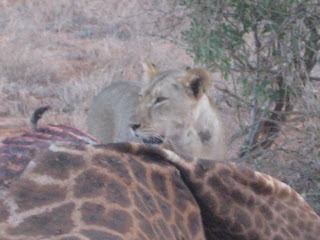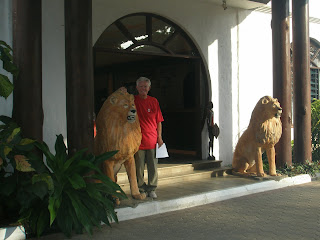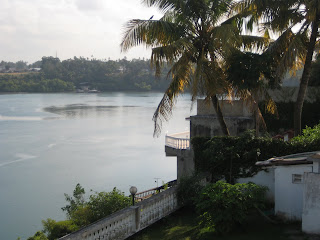Hi to our Friends & Family from Kenya!

The measles program is proceeding very well. Full page articles are running about it in the local newspapers as health is such a problem here and the program is a very big one. The Church's part is about a million dollars a year around the world just for the measles program, which is a nice contribution, but really only a fraction of what the Church does for the poor and needy regularly around the world. It's wonderful to see where our tithing and fast offerings go...for the wealthier
LDS people, especially in America sending their offerings around the world to others less fortunate, many who are not members

of the Church. Of course, many of our
LDS Charities assistance is given, similar to this measles program, in coordination and partnership with other great organizations, like the Red Cross, UNICEF, the World Health Organizations, and, great people from other churches. It's truly wonderful to be a part of it. In the case of Kenya's measles program, the Red Cross people have told us it could never be done without the Church's financial help and the mobilizing work of missionaries here like
Corwin and Peggy. We love to be a part of their

work as they are careful to do the Church's role in a behinds the scenes way, very careful to give much credit to the Red Cross workers and the local volunteers, so that they can feel it was their work that made it successful long after we leave. It is fulfilling a great need, too, as just in today's local paper there was an article about over a dozen children who had broken out with measles who had never been vaccinated and are seriously ill.

It's wonderful to be driving around now and occasionally have people recognize our truck with it's measles banner or be walking on the street and have mothers come up to us and thank us for providing their babies and little children a measles "jab" in the arm. Communication, travel, and finances are such a problem and really slow us up. We can only withdraw around $250 dollars in shillings from the ATM at a time and then must go to another bank to get money to pay the volunteers, radio stations, etc.

And, of course, few have cars or even bikes, land phones, newspapers,
TV's, electricity, running water, etc, so it's very hard to coordinate it all. How can we reach several million people just here in Mombasa alone, Kenya's 2
nd largest city, much less the millions out in the villages and bush? It's discouraging sometimes, but we know it's working, because many branch presidents and village chiefs and the Red Cross are reporting hundreds and hundreds of children receiving the shots...so, we know the same is happening in the others areas
Corwin and Peggy are responsible for...and, probably elsewhere in Kenya where other missionaries are working on the same program. Our local Church members are so proud to be a part of it. They've generously given their time even though most, especially in the villages are without jobs and should be trying to scrape out a living. Our little sacrifices here are pretty puny when you watch many of them use the volunteer money we give them to feed their families, rather than for travel to their assigned villages in the bush to knock on doors and tell their countrymen about the shots. Instead, they walk for 2-4 hours in the very early morning and very late evening to and from their contacting area, so they can use the "transport" money we give them to buy a little food for their family.

It is true Christian service in the best and most basic way by a people who have very little themselves, giving to many of those who have even less. At the end we'll have roasted goat celebrations and show them a video about the program, including pictures of themselves. They will be one of the greatest parties they will ever experience in their lives, but to us they will seem materially so little...maybe costing the equivalent of dinner at Sizzler for our family.
Lawana has worked hard on the video and we already know how their reaction will be when they see themselves from how thrilled they are to just see their picture in our digital cameras of them that we have shown them all the way as we travel from town to town.
 Corwin
Corwin and Peggy, rather "Elder & Sister
Ogborn," are absolutely perfect for this mission... with their great abilities and especially their great love for these African people.

I don't think many of us could do such a mission, living in such a poor country and working with such poor people, many in poverty. I can't adequately describe that really...you just need to experience it. But, maybe this will help:

Being very grateful for arriving safely without an accident somewhere after driving through the bustling traffic of cars, taxis, Tu Tuts, Matatus, bicycles, and mostly walkers in the clogged Mombasa streets.

Thankful for the locked gate and security guards outside your apartment and the Uzi-armed guards at the ATM's, markets, etc, but fearful when you leave their area.

Constantly hoping we won't get malaria, yellow fever, typhoid, AIDS, Polio, snake bites, etc. from the things we eat or even touch. Being afraid and embarrassed what to do when offered precious food in a member's hut of a home, yet not wanting to offend them for their generous offer.
Being so glad about our work in the slums, especially, but being ashamed about finally getting home and quickly taking a shower and washing our clothes with heavy bleach and disinfectant.
Even in our own apartment, better than 99% of the country, making sure the mosquito netting is back together after getting up in the night to go the bathroom. That's after you remove your slippers again because you dare not go barefoot, even in your own apartment, because of parasites that may have been tracked onto your own floor.

Being afraid of mugging and car-jacking, especially when you have come back late at night, which you try very hard not to do and mission rules tell you absolutely not to do.
Poverty everywhere...and, the despair, hidden disease, hopelessness, etc. that goes with it. Yet, all that is countered by the wondrous adventure of this place.

Like, Muslims everywhere, in their black and white and some with brightly colored attire. The beautiful, dark eyes and eyebrows of the women... mysterious and beautiful behind their burkas that cover everything else.
Children singing so beautifully the songs of Zion with their different tribal Swahili accents.

Women walking everywhere with big bundles somehow balanced on their heads, while also carrying 5 gallon jugs of water and a baby strapped to their backs.

Beautiful little black faces every where with their bright eyes and white teeth and smiles a mile wide. How in the world can they have such beautiful white teeth when they have so little to eat and have never been to a dentist?

Vivid colors of bright clothing against the red dust, greenery (in some places), blue sky, white clouds. I have never in my life seen such colors... and, I have been all over this world.
Kind, loving, gentle, genuine, people...many somehow being that way despite their poverty. What right do I have to be unhappy sometimes?

Gorgeous sunsets and sunrises, vast savannas, the beauty and the danger of the bush, tall mountains and deep valleys, beautiful waterfalls, sea shores, and jungles...Africa has it all. It is so vast.

It's wild animals, birds, and reptiles... more variety than anywhere on earth. Witnessing the "law of the jungle" in person where it is so common to see how the weaker is taken down and eaten by the stronger right before your eyes.

Being greeted with a smiling "Jumbo!", thanked with a joyful "Asantae Sanna!", returned with a welcome thanks to you of "Carabu," given a heartfelt goodbye with a "Missuri Safaris!" and being assured "Hakuna Makata!" ("no problem!")...all with various versions of their tribal Swahili accents.

The poverty of little huts in the bush, many who seldom see a car, standing outside and waving to us with smiling faces as we drive by.

Giving pieces of candy, pencils, a few shillings to one child and then wondering where in the world the 50 others came from out of nowhere very quickly with their hands out...and, you wondering if you have enough for all.

Little children walking the dusty red roads to and from school in their brightly colored school uniforms. Then, seeing them covered with your dust and wondering how in the world they can keep their clothes so clean...and, how their mothers can do it when they must wash them in dirty streams when water cannot be hauled in or found.
Feeling the joy at the end of an exhausting day, knowing lives of babies and little children are being saved by the work. And, going to sleep with that knowledge knowing that it was worth it that day to miss out on the sightseeing that we could have been doing.
How blessed we are to be here. But, it is going by so very fast. We will never forget it and are so grateful for the opportunity.
We love you all very much and miss you, too. May God bless you all.
Love,
Dick and Lawana
NOTE: To continue reading the African Blogs, scroll down or click on the "older post" on the right.





















































